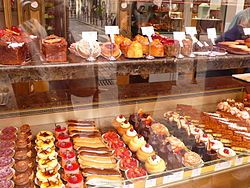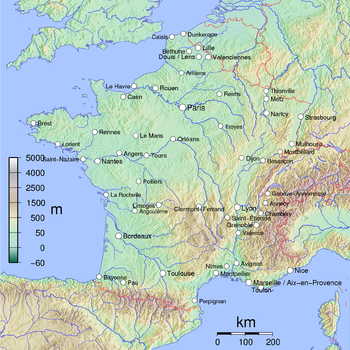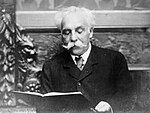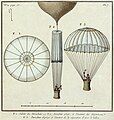Portal:France
| Main Page | Gazetteer |
Welcome to the France Portal!
Bienvenue sur le Portail France !

|

|
 | |
France, officially the French Republic, is a country located primarily in Western Europe. Its overseas regions and territories include French Guiana in South America, Saint Pierre and Miquelon in the North Atlantic, the French West Indies, and many islands in Oceania and the Indian Ocean, giving it one of the largest discontiguous exclusive economic zones in the world. Metropolitan France shares borders with Belgium and Luxembourg to the north, Germany to the northeast, Switzerland to the east, Italy and Monaco to the southeast, Andorra and Spain to the south, and a maritime border with the United Kingdom to the northwest. Its metropolitan area extends from the Rhine to the Atlantic Ocean and from the Mediterranean Sea to the English Channel and the North Sea. Its eighteen integral regions—five of which are overseas—span a combined area of 643,801 km2 (248,573 sq mi) and have a total population of nearly 68.4 million as of January 2024[update]. France is a semi-presidential republic with its capital in Paris, the country's largest city and main cultural and commercial centre.
Metropolitan France was settled during the Iron Age by Celtic tribes known as Gauls before Rome annexed the area in 51 BC, leading to a distinct Gallo-Roman culture. In the Early Middle Ages, the Franks formed the Kingdom of Francia, which became the heartland of the Carolingian Empire. The Treaty of Verdun of 843 partitioned the empire, with West Francia evolving into the Kingdom of France. In the High Middle Ages, France was a powerful but decentralized feudal kingdom, but from the mid-14th to the mid-15th centuries, France was plunged into a dynastic conflict with England known as the Hundred Years' War. In the 16th century, French culture flourished during the French Renaissance and a French colonial empire emerged. Internally, France was dominated by the conflict with the House of Habsburg and the French Wars of Religion between Catholics and Huguenots. France was successful in the Thirty Years' War and further increased its influence during the reign of Louis XIV.
The French Revolution of 1789 overthrew the Ancien Régime and produced the Declaration of the Rights of Man, which expresses the nation's ideals to this day. France reached its political and military zenith in the early 19th century under Napoleon Bonaparte, subjugating part of continental Europe and establishing the First French Empire. The collapse of the empire initiated a period of relative decline, in which France endured the Bourbon Restoration until the founding of the French Second Republic which was succeeded by the Second French Empire upon Napoleon III's takeover. His empire collapsed during the Franco-Prussian War in 1870. This led to the establishment of the Third French Republic, and subsequent decades saw a period of economic prosperity and cultural and scientific flourishing known as the Belle Époque. France was one of the major participants of World War I, from which it emerged victorious at great human and economic cost. It was among the Allies of World War II, but it surrendered and was occupied in 1940. Following its liberation in 1944, the short-lived Fourth Republic was established and later dissolved in the course of the defeat in the Algerian War. The current Fifth Republic was formed in 1958 by Charles de Gaulle. Algeria and most French colonies became independent in the 1960s, with the majority retaining close economic and military ties with France.
France retains its centuries-long status as a global centre of art, science, and philosophy. It hosts the fourth-largest number of UNESCO World Heritage Sites and is the world's leading tourist destination, receiving 100 million foreign visitors in 2023. A developed country, France has a high nominal per capita income globally, and its advanced economy ranks among the largest in the world by both nominal GDP and PPP-adjusted GDP. It is a great power, being one of the five permanent members of the United Nations Security Council and an official nuclear-weapon state. France is a founding and leading member of the European Union and the eurozone, as well as a member of the Group of Seven, NATO, OECD, and Francophonie. (Full article...)
The War of the League of Cambrai, sometimes known as the War of the Holy League and several other names, was fought from February 1508 to December 1516 as part of the Italian Wars of 1494–1559. The main participants of the war, who fought for its entire duration, were France, the Papal States, and the Republic of Venice; they were joined at various times by nearly every significant power in Western Europe, including Spain, the Holy Roman Empire, England, the Duchy of Milan, the Republic of Florence, the Duchy of Ferrara, and the Swiss.
The war started with the Italienzug of Maximilian I, King of the Romans, crossing into Venetian territory in February 1508 with his army on the way to be crowned Holy Roman Emperor by the Pope in Rome. Meanwhile, Pope Julius II, intending to curb Venetian influence in northern Italy, brought together the League of Cambrai—an anti-Venetian alliance consisting of him, Maximilian I, Louis XII of France, and Ferdinand II of Aragon—which was formally concluded in December 1508. Although the League was initially successful, friction between Julius and Louis caused it to collapse by 1510; Julius then allied himself with Venice against France. (Full article...)
Fauré was born into a cultured but not particularly musical family. His talent became clear when he was a small boy. At the age of nine, he was sent to a music college in Paris, where he was trained to be a church organist and choirmaster. Among his teachers was Camille Saint-Saëns, who became a lifelong friend. After graduating from the college in 1865, Fauré earned a modest living as an organist and teacher, leaving him little time for composition. When he became successful in his middle age, holding the important posts of organist of the Église de la Madeleine and director of the Paris Conservatoire, he still lacked time for composing; he retreated to the countryside in the summer holidays to concentrate on composition. By his last years, Fauré was recognised in France as the leading French composer of his day. An unprecedented national musical tribute was held for him in Paris in 1922, headed by the president of the French Republic. Outside France, Fauré's music took decades to become widely accepted, except in Britain, where he had many admirers during his lifetime.
Selected fare or cuisine –

A pâtisserie (French: [pɑtisʁi]), patisserie in English or pastry shop in American English, is a type of bakery that specializes in pastries and sweets. In French, the word pâtisserie also denotes a pastry as well as pastry-making.
While the making and selling of pastries may often be only one part of the activity of a bakery, in some countries pâtisserie or its equivalents are legally controlled titles which may only be used by bakeries that employ a licensed "master pastry chef" (French: maître pâtissier; Dutch: meester banketbakker; German: Konditormeister). For example, in France and Belgium, the maître pâtissier is a pastry chef who has completed a lengthy training process, typically an apprenticeship, and passed a written examination. (Full article...)
La Pausa is a large detached villa in Roquebrune-Cap-Martin, in the Alpes-Maritimes department of France. It was designed and built by the French fashion designer Coco Chanel in the early 1930s, and owned by Chanel until 1953. La Pausa was sold by Chanel to the Hungarian publisher Emery Reves. The former British Prime Minister Winston Churchill spent roughly a third of each year at La Pausa from 1956 to 1958 with Reves and his wife, Wendy, and wrote and edited part of his History of the English Speaking Peoples there. La Pausa was occupied by Wendy Reves until 2007. The principal rooms of La Pausa and its significant art collection were recreated at the Dallas Museum of Art during her lifetime and under her direction. The Reves wing was opened in 1985.
Situated above the village of Roquebrune, the house enjoys views toward Menton and the French border with Italy on one side, and Monaco on the other. Its name refers to the legend that Mary Magdalene "paused" near here on her journey from Jerusalem following the crucifixion of Jesus. (Full article...)
Featured pictures
In the news
- 19 December 2024 –
- France's Directorate-General for External Security reports that four French nationals detained in Burkina Faso on allegations of being foreign intelligence agents have been released following mediation by Morocco. (ABC News)
- 19 December 2024 – Mazan rapes
- The Judicial Court in Avignon, France, finds Dominique Pelicot guilty of the aggravated rape of his ex-wife Gisèle Pelicot, and imposes the maximum sentence of 20 years in prison. The 50 other defendants in the case are also convicted of crimes ranging from attempted rape to aggravated rape, and receive prison sentences ranging from three to 15 years. (Reuters)
- 18 December 2024 – Armenia–Azerbaijan border crisis
- Azerbaijani President Ilham Aliyev says that arms sent by France to Armenia pose a threat to Azerbaijan. (Trend News Agency)
- 15 December 2024 – 2024–25 South-West Indian Ocean cyclone season
- Thousands of people are believed to have been killed by Cyclone Chido in the French overseas department of Mayotte, with the cyclone also causing damage in the Comoros and Mozambique. (The Independent)
Did you know –
- ...that the construction of Basilica Cathedral St. Peter and St. Patern, Vannes (pictured) took seven centuries and featured styles from Romanesque to Neo Gothic?
- ...that the French admiral Dupetit Thouars took possession of the Tahiti archipelago against his government's will?
- ...that Claude Aveline met Jean Vigo in a health clinic and 28 years later founded an award in his honor?
Topics
-
Main Category - France, List of basic France topics
- Historic Periods - Prehistoric France - Celtic Gaul - Roman Gaul - Frankish Empire - Medieval France - Early Modern France - Nineteenth century France - Twentieth century France
- Major Events - Hundred Years' War - French Renaissance - Wars of Religion - French Revolution - Franco-Prussian War - Dreyfus Affair - World War I - World War II - Vichy France - Algerian War - Military history
- Dynasties and Regimes - Merovingians - Carolingians - Capetian Dynasty - Valois Dynasty - Bourbon Dynasty - Ancien Régime in France - First Empire - Second Empire - Third Republic - Fourth Republic - Fifth Republic
- Monarchs of France - List of French monarchs - Charlemagne - Louis I the Pious - Charles II the Bald - Louis II the Stammerer - Louis III - Carloman - Charles III the Fat - Eudes (Odo) - Charles III the Simple - Robert I - Raoul (Rudolph) of Burgundy - Louis IV d'outremer - Lothair - Louis V the Indolent - Hugh Capet - Robert II the Pious - Henri I - Philippe I - Louis VI the Fat - Louis VII the Young - Philippe II Augustus - Louis VIII the Lion - Louis IX Saint Louis - Philippe III the Bold - Philippe IV the Fair - Louis X the Quarreller - Jean I the Posthumous - Philippe V the Tall - Charles IV the Fair - Philip VI of Valois - Jean II the Good - Charles V - Charles VI - Charles VII - Louis XI - Charles VIII - Louis XII - François I - Henri II - François II - Charles IX - Henri III - Henri IV - Louis XIII - Louis XIV - Louis XV - Louis XVI - Napoleon I - Napoleon II - Louis XVIII - Charles X - Louis-Philippe - Napoleon III
- Other Major Historical Figures - Catherine de Medicis - Cardinal Richelieu - Mazarin - Jean-Baptiste Colbert - Jacques Necker - Jean Jaurès
- Heads of State of France since 1871 - President of the French Republic
- Third Republic: Adolphe Thiers • Patrice MacMahon, duc de Magenta • Jules Grévy • Marie François Sadi Carnot • Jean Casimir-Perier • Félix Faure • Émile Loubet • Armand Fallières • Raymond Poincaré • Paul Deschanel • Alexandre Millerand • Gaston Doumergue • Paul Doumer • Albert Lebrun
- Vichy France: Philippe Pétain
- Free France: Charles de Gaulle
- Provisional Government: Charles de Gaulle • Félix Gouin • Georges Bidault • Léon Blum
- Fourth Republic: Vincent Auriol • René Coty
- Fifth Republic: Charles de Gaulle • Georges Pompidou • Valéry Giscard d'Estaing • François Mitterrand • Jacques Chirac • Nicolas Sarkozy • François Hollande • Emmanuel Macron
- Heads of Government of France since 1871 - Prime Minister of France
- Third Republic: Dufaure • de Broglie • de Cissey • Buffet • Dufaure • Simon • de Broglie • de Rochebouët • Dufaure • Waddington • de Freycinet • Ferry • Gambetta • de Freycinet • Duclerc • Fallières • Ferry • Brisson • de Freycinet • Goblet • Rouvier • Tirard • Floquet • Tirard • de Freycinet • Loubet • Ribot • Dupuy • Casimir-Perier • Dupuy • Ribot • Bourgeois • Méline • Brisson • Dupuy • Waldeck-Rousseau • Combes • Rouvier • Sarrien • Clemenceau • Briand • Monis • Caillaux • Poincaré • Briand • Barthou • Doumergue • Ribot • Viviani • Briand • Ribot • Painlevé • Clemenceau • Millerand • Leygues • Briand • Poincaré • François-Marsal • Herriot • Painlevé • Briand • Herriot • Poincaré • Briand • Tardieu • Chautemps • Tardieu • Steeg • Laval • Tardieu • Herriot • Paul-Boncour • Daladier • Sarraut • Chautemps • Daladier • Doumergue • Flandin • Bouisson • Laval • Sarraut • Blum • Chautemps • Blum • Daladier • Reynaud • Pétain
- Vichy France: Pétain • Laval
- Provisional Government: de Gaulle • Gouin • Bidault • Blum
- Fourth Republic: Ramadier • Schuman • Marie • Schuman • Queuille • Bidault • Queuille • Pleven • Queuille • Pleven • Faure • Pinay • Mayer • Laniel • Mendès-France • Faure • Mollet • Bourgès-Maunoury • Gaillard • Pflimlin • de Gaulle
- Fifth Republic: Debré • Pompidou • Couve de Murville • Chaban-Delmas • Messmer • Chirac • Barre • Mauroy • Fabius • Chirac • Rocard • Cresson • Bérégovoy • Balladur • Juppé • Jospin • Raffarin • de Villepin • Fillon • Ayrault • Valls • Cazeneuve • Philippe • Castex
- Third Republic: Dufaure • de Broglie • de Cissey • Buffet • Dufaure • Simon • de Broglie • de Rochebouët • Dufaure • Waddington • de Freycinet • Ferry • Gambetta • de Freycinet • Duclerc • Fallières • Ferry • Brisson • de Freycinet • Goblet • Rouvier • Tirard • Floquet • Tirard • de Freycinet • Loubet • Ribot • Dupuy • Casimir-Perier • Dupuy • Ribot • Bourgeois • Méline • Brisson • Dupuy • Waldeck-Rousseau • Combes • Rouvier • Sarrien • Clemenceau • Briand • Monis • Caillaux • Poincaré • Briand • Barthou • Doumergue • Ribot • Viviani • Briand • Ribot • Painlevé • Clemenceau • Millerand • Leygues • Briand • Poincaré • François-Marsal • Herriot • Painlevé • Briand • Herriot • Poincaré • Briand • Tardieu • Chautemps • Tardieu • Steeg • Laval • Tardieu • Herriot • Paul-Boncour • Daladier • Sarraut • Chautemps • Daladier • Doumergue • Flandin • Bouisson • Laval • Sarraut • Blum • Chautemps • Blum • Daladier • Reynaud • Pétain
- Historic periods: French Renaissance - French Baroque and Classicism - French Rococo and Neoclassicism - French art of the 19th century - French art of the 20th century
- Artistic Schools: Impressionism - Cubism - Surrealism
- Art museums and galleries: Louvre - Palace of Versailles - Musée d'Orsay - Centre Georges Pompidou - Musée Picasso - Musée Rodin
- Historic periods: Medieval French literature - French Renaissance literature - French literature of the 17th century - French literature of the 18th century - French literature of the 19th century - French literature of the 20th century
- Football (Soccer): French football clubs - French footballers - Football in France
- Rugby (union): Clubs in France - French rugbymen - Rugby union in France
- Tennis: French Open
- Cycling: Tour de France
- Motorsport: 24 Hours of Le Mans - French Grand Prix
- Ski resorts: Chamonix - Tignes - Val Thorens - Les Trois Vallées - La Plagne - Les Arcs - Courchevel - Méribel - Val d'Isère - Les Deux Alpes - Megève
History of France - History of France
Culture and People - Culture of France - Culture of France - Museums in France - French people - Health in France - Education in France - Education in France - Religion in France - Languages of France - Languages of France - French language - French cuisine - French cuisine - French wine - Archaeology of France - Basque culture - Culture of Brittany
Politics and Government - Government of France - Government of France - French National Assembly - French Senate - Law of France - French politics - Politics of France - Military of France - Foreign relations of France - Flags of France
Economy, Industry and Media - Economy of France - Economy of France - Economic history of France - French businesspeople - Companies of France - French trade unions - Communications in France - Mass media in France - French space program - French airlines
Visual and Plastic Arts - French art - French artists - French architecture - French art
Literature - French literature - French writers - French literature - French poetry
Music - French music - French composers - French musicians - Music of France - French folk music - French rock - French hip hop and rap
Cinema - Cinema of France - Cinema of France - French actors - French film directors - French film producers - César Award winners - Cannes Film Festival
Theater - French theatre - French dramatists and playwrights - Theatres in France - Avignon Festival - Comédie française
Sports- Sport in France - French sportspeople - France at the Olympics -
Geographic topics
-
Main Category - France
- Coastlines: Atlantic Ocean - Bay of Biscay ("Golfe de Gascogne") – Mediterranean Sea (Golfe du Lion) - Côte d'Azur ("French Riviera") – English Channel
- Islands: Belle Île – Corsica – Île d'Oléron – Ouessant – Île de Ré – Île d'Yeu - Réunion - Martinique - Guadeloupe - Saint Barthélemy - Saint Martin - Saint Pierre and Miquelon
- Rivers and streams:
- Major rivers: Loire – Rhine – Rhône – Seine – Garonne - Gironde estuary - Dordogne – Meuse – Escaut – Saône – Marne – Moselle
- Other rivers: Adour – Charente - Aulne – Blavet – Erdre – Hérault – Odet – Orb – Orne – Rance – Sèvre Nantaise – Sèvre Niortaise – Var - Aisne – Allier – Ariège – Aube – Cher – Doubs – Durance – Indre – Ill – Isère – Lot – Maine – Mayenne – Meurthe – Oise - Somme - Tarn – Verdon – Vienne – Vire – Yonne
- Canals: Canal du Midi – Canal de Nantes à Brest – Canal Saint-Martin – Briare Canal – Canal of Burgundy – Grand Canal d'Alsace – Sambre–Oise Canal
- Lakes: Lake Annecy – Lac du Bourget – Lake Geneva (Lac Léman) – Étang de Thau – Étang de Berre
- Mountains:
- Major Mountain ranges: Alps – French Prealps – Pyrénées – Massif Central – Jura – Vosges
- Other Mountain ranges: Aravis Range – Bauges – Belledonne – Chartreuse Mountains – Massif des Écrins – Vercors
- Mountain peaks: Mont Blanc – Aiguille du Midi – Barre des Écrins – Ballon d'Alsace – Crêt de la Neige – Grandes Jorasses – Meije – Mont Aigoual – Mont Ventoux – Pic du Midi - Mont Pelvoux – Puy de Dôme – Puy de Sancy
- Forests: Forest of Fontainebleau – Forest of Compiègne – Paimpont forest – Forest of Saint-Germain-en-Laye
- National parks and natural regions: Cévennes National Park – Écrins National Park – Mercantour National Park – Port-Cros National Park – Pyrénées National Park – Vanoise National Park – Boulonnais – Bresse – Beaujolais – Camargue – Pays de Bray – Sundgau – Vexin
- Major cities: Paris (Paris) – Marseille – Lyon – Lille – Toulouse – Nice – Nantes – Strasbourg – Montpellier – Bordeaux – Rennes – Douai – Le Havre – Reims – Lens – Saint-Étienne – Toulon – Grenoble – Angers – Brest – Le Mans – Dijon – Clermont-Ferrand – Aix-en-Provence – Amiens – Nîmes – Tours – Limoges – Metz – Besançon – Caen – Orléans - Mulhouse – Perpignan - Boulogne-Billancourt – Rouen – Dunkirk – Nancy – Villeneuve-d'Ascq – Saint-Denis, Réunion
- Other: Gardens in France - Cemeteries in France - Transport in France - Tourism in France - Nature conservation in France
- Ski resorts: Chamonix - Tignes - Val Thorens - Les Trois Vallées - La Plagne - Les Arcs - Courchevel - Méribel - Val-d'Isère - Les Deux Alpes - Megève
Geography - Geography of France - Geography of France - Regions of France - Provinces of France - Subdivisions of France - Subdivisions of France - Overseas France

Categories
Related portals
Things you can do
French Wikipedia
 |
There is a French version of Wikipedia, the free encyclopedia. |
Wikiproject
Associated Wikimedia
The following Wikimedia Foundation sister projects provide more on this subject:
-
Commons
Free media repository -
Wikibooks
Free textbooks and manuals -
Wikidata
Free knowledge base -
Wikinews
Free-content news -
Wikiquote
Collection of quotations -
Wikisource
Free-content library -
Wikiversity
Free learning tools -
Wikivoyage
Free travel guide -
Wiktionary
Dictionary and thesaurus
More portals
Parent portals: Europe | European Union









































